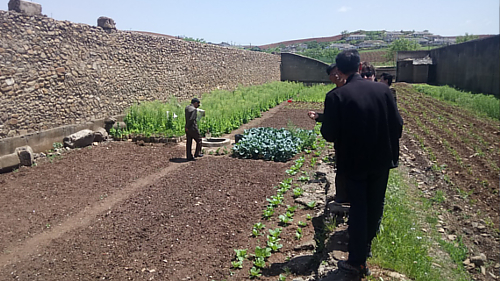Beneficiaries
42,578
Duration
01/09/16 > 31/08/19
Total budget
€1,200,000

Food security & Lifelihood
Funding


Programme details
Partners
- The Ministry of Urban Development
- The Academy of Sciences and Agriculture
- The Sohung Epidemic Control Department
- Central Vegetable Research Institute
- Sohung People’s Committees
With a view to sustainably improving the consumption and quality of the vegetables available to the people of Sohung and the children in social institutions, the players in the supply chain and TGH emphasised that overall vegetable production needed to be improved, as did the conditions under which the goods were distributed and the capacity to manage hygiene and nutrition.
The action was designed around these common conclusions and led to a number of results.
- Increase in vegetable production :
On Sohung’s cooperative farms, vegetable production is structurally unable to meet the needs of the population, particularly in urban areas. From the point of view of a rational nutritional approach, increasing vegetable production is a sine qua non for improving dietary diversity. It seemed a priority to increase vegetable production on four farms in Sohung, which produce vegetables for children’s institutions, by working on various issues (length of growing season, improved farming practices, improved soil fertility management). The concrete results achieved are: an increase in labour productivity, a 1-month extension of the vegetable growing season on the Sohung farms, an increase in the area cultivated with winter vegetables (greenhouses) from 0 to 2 ha, an increase in the amount of manure produced, and an improvement in soil fertility thanks to the additional amount of fertiliser produced.
- Improving post-production practices :
Around 30% of vegetable production on Sohung farms is dedicated to supplying the city of Sohung, including children’s institutions. During the harvest season, the managers of the farms and institutions estimate that post-harvest losses are around 25%, mainly due to poor availability of labour during the peak of the harvest period, inadequate storage facilities (vegetables rotten before delivery and crushed during transport), and irregular delivery capacity (uncertain access to means of transport and fuel on the farms). In order to improve the quality of the produce offered to children, the means of transport need to be improved, as do the means of storage and distribution at both farm and institutional level. The expected results of the project are as follows: to reduce losses in the vegetable supply chain by 50% during harvesting/preservation/transport of the goods, and also to reduce losses within the institutions.
- Capacity building for local players in production, post-production and hygiene management:
Building the capacity of project participants is essential to adapting the production system to the proposed innovations and taking advantage of the increase in labour productivity. Activities such as pest management, crop rotation and fodder production will then be improved. In this way, the proposed action meets the challenge of sustainability. The project aims to strengthen the knowledge and skills of the local stakeholders involved: The Sohung People’s Committees, The Sohung Epidemic Control Department, and the Academy of Science and Agriculture, through research, experimental work and exchanges with international experts, and to facilitate the dissemination of this knowledge and thus enable the project to be duplicated at county level through training and publications.